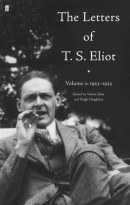 Pertinent to the week’s doings around here, Michael Wood reviews a new volume of T. S. Eliot’s letters:
Pertinent to the week’s doings around here, Michael Wood reviews a new volume of T. S. Eliot’s letters:
Eliot’s description of himself as “within measurable distance of the end of my tether” combines distress with elegance. Writing to Herbert Read he says: “I have been of late exceptionally busy and exceptionally worried, even for me.” And writing again to his brother he says his life is such a mess that it would make him laugh, “if any Eliot could ever laugh.” He likes this one so much he repeats it to Harold Monro a day later with a minor variation: “if any Eliot ever could laugh.”
But there is a sort of morality to all this that shifts it beyond complaint, kink and joke, and helps us to understand the poetry and the criticism. Eliot not only thought life was hard, he thought it ought to be hard, and with this verdict he joined all those other modern writers and thinkers who adopted or at least were tempted by what J. P. Stern in another context calls the “dear purchase,” the notion that sacrifice is worth nothing if it doesn’t cost too much.

